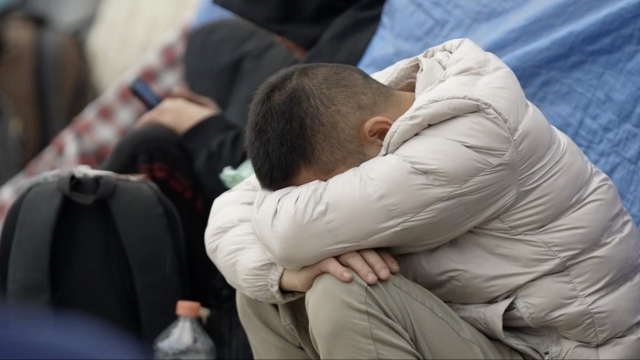When United States citizens envision the country’s southern border, they often picture thousands of Central Americans seeking asylum. However, there are migrants from all over the world who face their own challenges when trying to enter the U.S. from its neighbor country of Mexico.
While federal immigration data showed a 14% drop in migrant encounters along the southwest border in October, arrests of Chinese refugees rose slightly to more than 4,000 – mostly in the San Diego sector.
On windswept southern California high chaparral, families, friends and strangers alike wait in the desert elements for days to be detained and processed for asylum court dates.
In the last 10 months, San Diego's Catholic Charities said it assisted almost 3,000 Chinese migrants fleeing a flagging economy and repressive government in the People's Republic of China, mostly turning up along the U.S.-Mexico border.
So far this year, Panamanian immigration authorities report about 16,000 Chinese crossing through the treacherous jungle of the Darien Gap, which lies between Panama and South America, to eventually make it to the U.S.
The communication gap — many don't speak Spanish or English — makes things increasingly difficult on top of their unbounded fear.
Vino Pajanor of Catholic Charities of San Diego said the tough trip combined with persecution at home comes "down hard on them."
Many of the Chinese migrants Scripps News met at the border did not want to be interviewed or were afraid when approached.
One man, who didn't want to be shown on camera, told Scripps News he feared the authoritarian government would punish his family back home.
"People come in and say, 'I was persecuted because of my political affiliations back home' or about 'who I am as an individual' or 'who I was associated with as a family member'," said Pajanor.
SEE MORE: More Chinese migrants take long journey to US border seeking asylum
At another migrant encampment 10 minutes down the road, Scripps News met people from western Asia and southeast Europe seeking refuge in the U.S.
Like the Chinese migrants, a group of migrants from Turkey was worried about their safety. They told Scripps News that they're fleeing the repressive government of President Recep Tayyip Erdogan.
Thousands of refugees pass through tiny Jacumba Hot Springs, 75 miles southeast of San Diego. It’s where the border walls end.
Jacqueline Arellano of the aid group Border Kindness said people from all kinds of places show up at the border seeking asylum.
"Every language, so many nationalities, people from all over the world are having to leave their homes," she said. "And that's for a variety of reasons. But this is resulting in a global migration shift. And it's happening everywhere."
Volunteers from Border Kindness said the federal government does little to help these people until the U.S. Border Patrol moves the migrants to actual federal facilities, sometimes taking up to three or four days.
"If they don't speak Spanish or English, very, very often, their needs are going to go unmet, as much as we try to get interpretation," said Arellano. "This effort is being organized by regular people. We are small organizations."
Volunteer Sam Shultz called the destitute spots where the migrants wait "detention camps."
"If they try to leave, they are told to go back every time. Now, if that's not detention, I don't know what is," he said.
Shultz noted that the border patrol denies these people are being detained "but if they try to walk into town to buy a pack of cigarettes, they are told to go back."
SEE MORE: US border crossings by migrant families hit record high
The U.S. Border Patrol said it's not accurate to call them "detention" camps, instead calling the spots "migrant gathering sites."
Border Patrol said agents try to begin processing the people within days.
In a statement to Scripps News, the Border Patrol said it is devoting resources to help the migrants "callously placed by for-profit smuggling organizations, often without proper preparation."
It said it continues to provide legal pathways for asylum seekers using online appointment systems to cross at official ports of entry but many times migrants tell Scripps News those appointments involve months of waiting in dangerous border towns.
Border Patrol said people who enter the country without a legal basis for staying are subject to a five-year ban on re-entry.
Aid workers said they frequently treat injured migrants who fall trying to scale the walls dividing San Diego from Tijuana, and neither physical nor legal barriers deter people desperate to find refuge.
"People that are seeking to be safe will attempt to come to the U.S. and cross into the U.S.," said Pedro Rios of the American Friends Service Committee. "Deterrence policies are a failure."
They keep coming, from around the world, praying for asylum and a chance at the American dream.
SEE MORE: Biden would block bill to kick migrants out of national park
Trending stories at Scrippsnews.com




